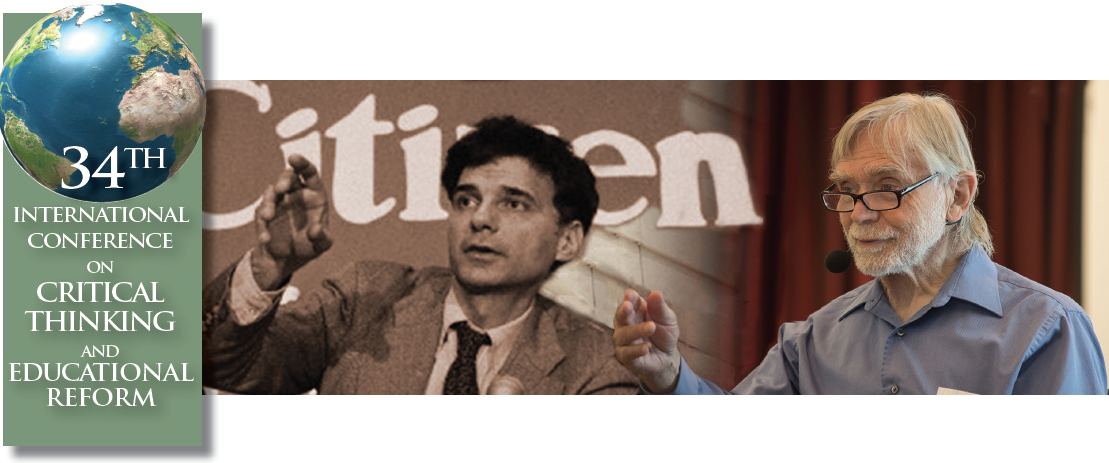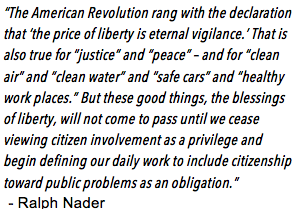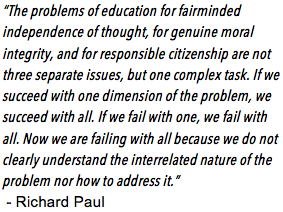

34th International Conference Theme:
Cultivating Educated Citizens and Critical Societies Through Explicit Fairminded Critical Thinking


The Center and Foundation for Critical Thinking have together hosted critical thinking academies and conferences for almost 35 years. During that time, we  have advanced the principles and best practices of fairminded critical thought in education and in society.
have advanced the principles and best practices of fairminded critical thought in education and in society.
Our annual conference provides a unique opportunity for you to improve your understanding of critical thinking, as well as your ability to more substantively foster it in instruction and all aspects of work and life.


At this year's International Conference on Critical Thinking and Educational Reform, we emphasize the importance of cultivating the critical public citizen, as we honor the  thought and work of Ralph Nader through the Bertrand Russell Scholars Lecture and program. Accordingly, we offer sessions for educators and citizens, throughout the world, who are interested in improving their ability to reason through complex issues as public citizens and in all parts of life. Critical thinking is as essential to thinking like a skilled public citizen as it is to thinking like a skilled educator, administrator, psychologist, historian, scientist,doctor,parent, student…as it is to thinking well within any domain of human thought or through any important issue.
thought and work of Ralph Nader through the Bertrand Russell Scholars Lecture and program. Accordingly, we offer sessions for educators and citizens, throughout the world, who are interested in improving their ability to reason through complex issues as public citizens and in all parts of life. Critical thinking is as essential to thinking like a skilled public citizen as it is to thinking like a skilled educator, administrator, psychologist, historian, scientist,doctor,parent, student…as it is to thinking well within any domain of human thought or through any important issue.
Public citizens are keenly aware of their role as voting, contributing, integrated members of a democratic society. They recognize that the health of a society is given in the ways in which people in the society act and interact on a typical day – in the family, in intimate relationships, in marriage, in study and scholarship, in business, in non-profit work, in government administration. Public citizens perceive contributing to a better community, and hence to a better world, to be the responsibility of all people in all societies.
But critical public citizens do not always agree on all issues. They do not always agree on how to deal with complex issues or problems. Indeed, because of the nature of complex issues, even reasonable persons often disagree on how best to conceptualize and approach them; they frequently disagree on the very questions to be addressed. To make matters worse, egocentric and sociocentric tendencies forever dwell just below the surface, poisoning human minds, even highly ‘educated’ minds pursing just ends. These tendencies are intrinsic to all people and give rise to such human pathologies as narrow-mindedness, group-think, intellectual arrogance, hypocrisy, self-righteousness, infighting and backstabbing.
Many of the deep-seated pathologies that humans acquire come from the process of being socialized or indoctrinated into the beliefs of society. Much of what we think or do we have been taught to think or do by the social groups that have shaped us. Those who want to free themselves from indoctrination, to become intellectually emancipated, must understand this problem – sociocentrism - as a significant barrier to their development and begin seeing its influence on their daily thinking.
When students internalize, through the educational process, a substantive, explicit, fairminded, conception of critical thinking, they develop a network of skills, traits, and insights crucial in working through the complex problems faced by full-time public citizens; they are also familiar with their own unique egocentric and sociocentric pathologies, and are deeply concerned with rooting them out and replacing them with healthier habits. Such students listen intently to arguments with which they disagree (i.e. ‘Intellectual Empathy’) and are moved by reasoning superior to their own (i.e. ‘Confidence in Reason’). They distinguish, in any given sh, between what they know and what they do not know (i.e. ‘Intellectual Humility’). They can stand alone in their beliefs, if reason and evidence compel them to do so (i.e. ‘Intellectual Autonomy’). They routinely:
• raise vital questions within disciplines, formulating them clearly and precisely.
• gather and assess information, using ideas to interpret that information insightfully.
• come to well reasoned conclusions and solutions, testing them against relevant criteria and standards.
• reason within subjects and disciplines, exploring and assessing - as need be - their assumptions, organizing concepts, implications, and practical consequences.
• communicate effectively with others using the language of academic disciplines and of educated public discourse.
• relate what they are learning in a given subject to other subjects, as well as to what is significant in human life.
• apply intellectual skills to problems in everyday life.
• contribute to a more rational and just world.
At the 34th International Conference on Critical Thinking and Educational Reform we focus on internalizing a substantive, fairminded (strong-sense) conception of critical thinking consisting in these and other related critical thinking skills, traits and insights. Such a conception can be fostered in teaching and learning at all levels, and is fundamental to cultivating the educated person, the ethical reasoned, the critical public citizen.